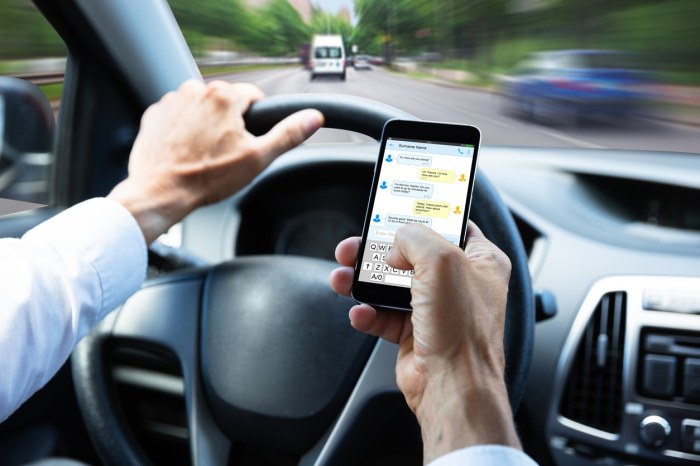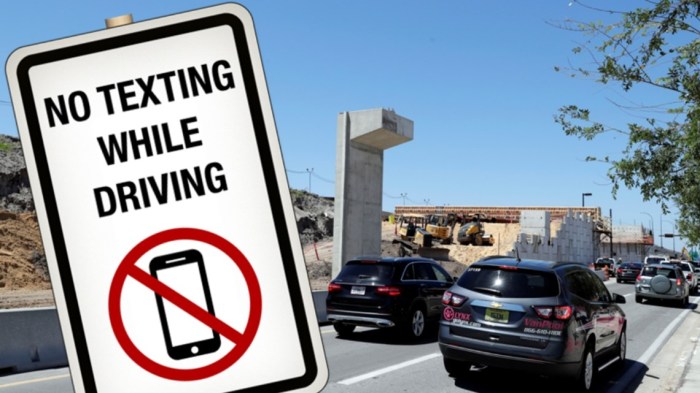Current State of Texting While Driving Laws in Florida: Florida Might Fully Ban Texting While Driving
Florida has taken a proactive approach to combating distracted driving, particularly texting while driving. The state has implemented laws aimed at deterring this dangerous behavior and promoting safer roads.
Penalties for Texting While Driving in Florida
Florida’s laws regarding texting while driving are designed to discourage this behavior through a system of fines and penalties.
- First Offense: A fine of $30.
- Second Offense: A fine of $60.
- Third and Subsequent Offenses: A fine of $100.
It is important to note that these fines apply to drivers of all ages, and they are considered moving violations.
Statistics on Texting While Driving Accidents in Florida
Distracted driving, including texting while driving, poses a significant threat to road safety. The consequences can be severe, leading to accidents, injuries, and even fatalities.
“According to the National Highway Traffic Safety Administration (NHTSA), in 2020, there were 3,142 traffic fatalities in Florida. Of these, 245 were attributed to distracted driving, including texting while driving.”
These statistics highlight the serious risks associated with texting while driving and emphasize the importance of strict enforcement of related laws.
Arguments for a Full Ban on Texting While Driving
A complete ban on texting while driving in Florida is a controversial proposal. However, a thorough examination of the potential benefits and the safety concerns associated with texting while driving reveals compelling reasons for such a ban.
Safety Concerns Associated with Texting While Driving
Texting while driving poses a significant threat to road safety. The act of texting, even for a few seconds, can drastically impair a driver’s ability to focus on the road, leading to serious consequences.
- Distracted Driving: Texting while driving is a prime example of distracted driving. Drivers who text are not fully engaged in the task of driving, and their attention is divided between the road and their mobile device. This divided attention can lead to a range of dangerous driving behaviors, such as failing to stop at red lights, swerving out of lanes, and driving at excessive speeds.
- Slower Reaction Time: Texting while driving significantly increases reaction time. Drivers who text take longer to react to hazards on the road. This delay in reaction time can be the difference between avoiding an accident and causing a collision.
- Increased Risk of Accidents: Studies have consistently shown a strong correlation between texting while driving and an increased risk of accidents. The National Highway Traffic Safety Administration (NHTSA) estimates that texting while driving contributes to over 1.6 million car accidents annually in the United States.
Potential Benefits of a Full Ban
A full ban on texting while driving could have several positive impacts on road safety in Florida.
- Reduction in Accidents: A full ban would likely lead to a significant reduction in accidents caused by distracted driving. This reduction in accidents would translate into fewer injuries, fatalities, and property damage.
- Saving Lives: By reducing the number of accidents, a full ban could save lives. The NHTSA estimates that texting while driving is responsible for over 3,900 deaths each year in the United States.
- Promoting Safe Driving Habits: A full ban would send a clear message to drivers that texting while driving is unacceptable and unsafe. This message could encourage drivers to develop safer driving habits and prioritize road safety.
Impact on Distracted Driving Behavior
A full ban on texting while driving would likely have a significant impact on distracted driving behavior in Florida.
- Increased Awareness: A full ban would increase public awareness of the dangers of texting while driving. This awareness could lead to a change in attitudes and behaviors, encouraging drivers to be more mindful of their driving habits.
- Reduced Texting While Driving: A full ban would make it illegal to text while driving, which could lead to a significant reduction in the number of drivers who engage in this behavior.
- Encouraging Alternative Communication Methods: A full ban could encourage drivers to use alternative communication methods, such as hands-free devices or voice-activated assistants, while driving. These methods allow drivers to communicate without taking their hands off the wheel or their eyes off the road.
Arguments Against a Full Ban on Texting While Driving
While the dangers of texting while driving are undeniable, a full ban on the practice raises concerns about personal liberty, government overreach, and potential unintended consequences. Critics argue that such a ban might not be the most effective way to address distracted driving and could even lead to unforeseen problems.
Concerns About Personal Liberty and Government Overreach, Florida might fully ban texting while driving
Opponents of a full ban often argue that it represents an infringement on personal liberty. They believe that adults should have the right to make their own choices, even if those choices involve some level of risk. They question whether the government should have the authority to dictate what people can and cannot do in their personal vehicles. Critics also express concerns about the potential for overreach by law enforcement, fearing that a full ban could lead to increased scrutiny and harassment of drivers, particularly those from marginalized communities.
Potential Drawbacks of a Full Ban
While the intent of a full ban is to reduce distracted driving, critics point out several potential drawbacks. One concern is the difficulty of enforcement. It can be challenging to prove that someone was texting while driving, especially if they are not caught in the act. This can lead to inconsistencies in enforcement and create a perception of unfairness. Another concern is the potential for unintended consequences. For example, some argue that a full ban could encourage drivers to use other distracting devices, such as hands-free calling or navigation systems, which could still pose a risk.
Effectiveness of Alternative Approaches
Critics argue that alternative approaches, such as educational campaigns and technology-based solutions, might be more effective in reducing distracted driving. They believe that educating drivers about the dangers of texting while driving and promoting responsible phone use can have a significant impact on behavior. Additionally, they advocate for the use of technologies like smartphone apps that can automatically disable texting while driving or that can detect when a driver is using their phone and provide alerts.
Potential Impacts of a Full Ban
A full ban on texting while driving in Florida would have far-reaching consequences, impacting drivers, law enforcement, businesses, and the overall economy. This section examines the potential impacts across various stakeholders, explores challenges in implementation and enforcement, and analyzes the economic implications.
Impacts on Various Stakeholders
The impact of a full ban on texting while driving would be felt by various stakeholders, including drivers, law enforcement, and businesses. The following table summarizes these impacts:
| Stakeholder | Potential Impacts |
|—|—|
| Drivers | * Increased safety: Reduced risk of accidents and injuries.
* Increased awareness: Greater awareness of the dangers of distracted driving.
* Potential inconvenience: May require drivers to rely on hands-free devices or pull over to text. |
| Law Enforcement | * Increased enforcement: Higher workload for law enforcement officers.
* Potential for increased revenue: More citations issued for texting while driving.
* Challenges in enforcement: Difficulty in proving texting while driving. |
| Businesses | * Potential impact on businesses relying on mobile communication: Restrictions on mobile phone use while driving could affect businesses that rely heavily on communication.
* Potential for new business opportunities: Demand for hands-free devices and other technologies that promote safe driving could increase. |
Challenges in Implementing and Enforcing a Full Ban
Implementing and enforcing a full ban on texting while driving presents several challenges:
* Defining “texting”: Determining what constitutes “texting” can be difficult, as it includes various activities like checking social media, emailing, and using apps.
* Enforcement challenges: Observing and proving texting while driving can be challenging for law enforcement officers.
* Public acceptance: Some drivers may resist the ban and continue texting while driving, leading to challenges in enforcement.
* Technological advancements: The rapid evolution of mobile technology presents ongoing challenges in keeping up with new ways to use phones while driving.
Economic Implications of a Full Ban
A full ban on texting while driving could have significant economic implications:
* Impact on businesses relying on mobile communication: Businesses that rely on mobile communication, such as delivery services, ride-sharing companies, and transportation businesses, may experience disruptions.
* Potential for increased costs: Businesses may need to invest in hands-free devices or other technologies to comply with the ban.
* Potential for new business opportunities: The ban could create opportunities for businesses that develop and sell hands-free devices and other technologies that promote safe driving.
Alternatives to a Full Ban
A complete ban on texting while driving might be a drastic measure, and alternative approaches could be more effective in reducing distracted driving. These strategies aim to address the root causes of distracted driving, focusing on education, technology, and enforcement.
Technology-Based Solutions
Technology can play a significant role in reducing distracted driving.
- Smartphone Apps: Apps like DriveSafe.ly and Drivemode can automatically silence notifications and block distracting apps while driving. These apps can also monitor driving behavior and provide feedback to users.
- Vehicle Features: Many modern vehicles are equipped with features that can help reduce distractions, such as hands-free calling, voice-activated navigation systems, and driver-assistance systems that can warn of potential hazards.
- Smartphones: Some smartphones have built-in “Do Not Disturb” modes that can block calls, texts, and other notifications while driving. These features can be activated automatically based on location or time of day.
Educational Campaigns and Public Awareness Initiatives
Educating drivers about the dangers of distracted driving is crucial.
- Public Service Announcements (PSAs): Effective PSAs can raise awareness about the risks of texting while driving and encourage drivers to make safer choices.
- School Programs: Educating young drivers about distracted driving before they get behind the wheel can help prevent dangerous habits from forming.
- Community Outreach: Community organizations can play a vital role in spreading awareness about distracted driving and promoting safer driving practices.
Law Enforcement and Enforcement of Existing Laws
Law enforcement plays a crucial role in deterring texting while driving and enforcing existing laws.
- Increased Enforcement: Increased police presence and stricter enforcement of existing laws can help deter drivers from texting while driving. This includes issuing citations and fines for violations.
- Traffic Stops and Checkpoints: Traffic stops and checkpoints can help identify drivers who are texting while driving and enforce the law. These measures can also serve as a deterrent to other drivers.
- Public Awareness Campaigns: Law enforcement agencies can collaborate with other organizations to launch public awareness campaigns about the dangers of distracted driving and the consequences of violating traffic laws.
Florida might fully ban texting while driving – The debate over a full ban on texting while driving in Florida raises important questions about safety, individual liberties, and the role of technology in our lives. While some argue for a stricter approach to combat distracted driving, others emphasize the importance of personal responsibility and alternative solutions. Ultimately, the decision rests with Florida’s lawmakers, who must weigh the potential benefits of a full ban against the concerns of those who oppose it. The outcome will likely shape the future of distracted driving laws in the state and potentially influence similar legislation nationwide.
Florida’s proposed ban on texting while driving is a step in the right direction, but maybe we should also be looking at the future of driving. Imagine a world where augmented reality (AR) technology, developed by companies like Apple, Oculus, and Magic Leap , allows drivers to see important information like navigation and traffic updates projected directly onto their windshields, eliminating the need to look down at a phone.
This futuristic approach could help reduce distracted driving and create a safer experience for everyone on the road.
 Standi Techno News
Standi Techno News

